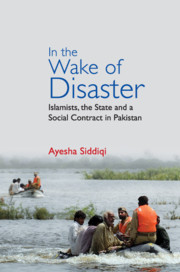Book contents
- Frontmatter
- Dedication
- Contents
- List of Figures, Boxes and Tables
- Acknowledgements
- Introduction: Setting the Scene
- 1 A Social Contract: State–Citizen Relations and Unfolding Disasters
- 2 The State as a Complex Web of Social Relations
- 3 The Ethnographic Social Contract
- 4 Advancing ‘Disaster Citizenship’
- 5 The Failing ‘Islamist Takeover’ in the Aftermath of the Indus Floods
- Conclusion: Disasters and the State–Citizen Relationship
- References
- Index
5 - The Failing ‘Islamist Takeover’ in the Aftermath of the Indus Floods
Published online by Cambridge University Press: 24 April 2019
- Frontmatter
- Dedication
- Contents
- List of Figures, Boxes and Tables
- Acknowledgements
- Introduction: Setting the Scene
- 1 A Social Contract: State–Citizen Relations and Unfolding Disasters
- 2 The State as a Complex Web of Social Relations
- 3 The Ethnographic Social Contract
- 4 Advancing ‘Disaster Citizenship’
- 5 The Failing ‘Islamist Takeover’ in the Aftermath of the Indus Floods
- Conclusion: Disasters and the State–Citizen Relationship
- References
- Index
Summary
This analysis has so far demonstrated that beyond social relations or ‘mixed up’ ideas of citizenship, people in Pakistan have a relationship with a larger entity, ‘the state’. The ethnographic social contract may include a construction of the state that has elements of kinship and hereditary structures but it very tangibly also includes an understanding of citizenship and the responsibility of the sarkar/hakumat/riyasat to these citizens, particularly during difficult and trying times. In the aftermath of the flooding disaster in 2010 and 2011 a more rights-based understanding of citizenship emerged, helping to push these progressive aspects of the social contract along. This final chapter will address the issue of ‘dominant’ political agents that theory suggests might, and popular narrative insists did, emerge in the aftermath of the flooding disaster in Pakistan. I engage with this idea to dismiss any remaining doubt on the existence of the social contract, one that has progressive elements, in the lower Sindh region of Pakistan.
The construction of the ‘disaster discourse’ affects the social contract between the state and its citizens as the prior contract is reassessed and negotiated in the wake of the crisis (Warner 2013). Pelling and Dill highlight that they are particularly interested in the extent to which this post-disaster ‘space is politicised whether it is populated by new or existing social organisations and how quickly and in what manner the state and other dominant social actors respond’ (2010, 27; emphasis added). Their analytical framework emphasises (a) the state's use of this political space, discussed in significant detail in the previous chapter, and (b) the way other social organisations instrumentalised this post-disaster political space.
This research has revealed (b) to be entirely connected and dependent on (a). Rather than being constructed in opposition to the state, the social organisation I study, the Jamaat-ud-Dawa (JuD), illustrates that it was only able to capture as much political space as the state allowed it to, and that it was not very interested in presenting itself as an ‘alternative’ paradigm to the state. The existence and very visible presence of the JuD in the aftermath of the disaster in 2010 and 2011 only served to illustrate that dominant position of the state in lower Sindh.
- Type
- Chapter
- Information
- In the Wake of DisasterIslamists, the State and a Social Contract in Pakistan, pp. 130 - 154Publisher: Cambridge University PressPrint publication year: 2019



